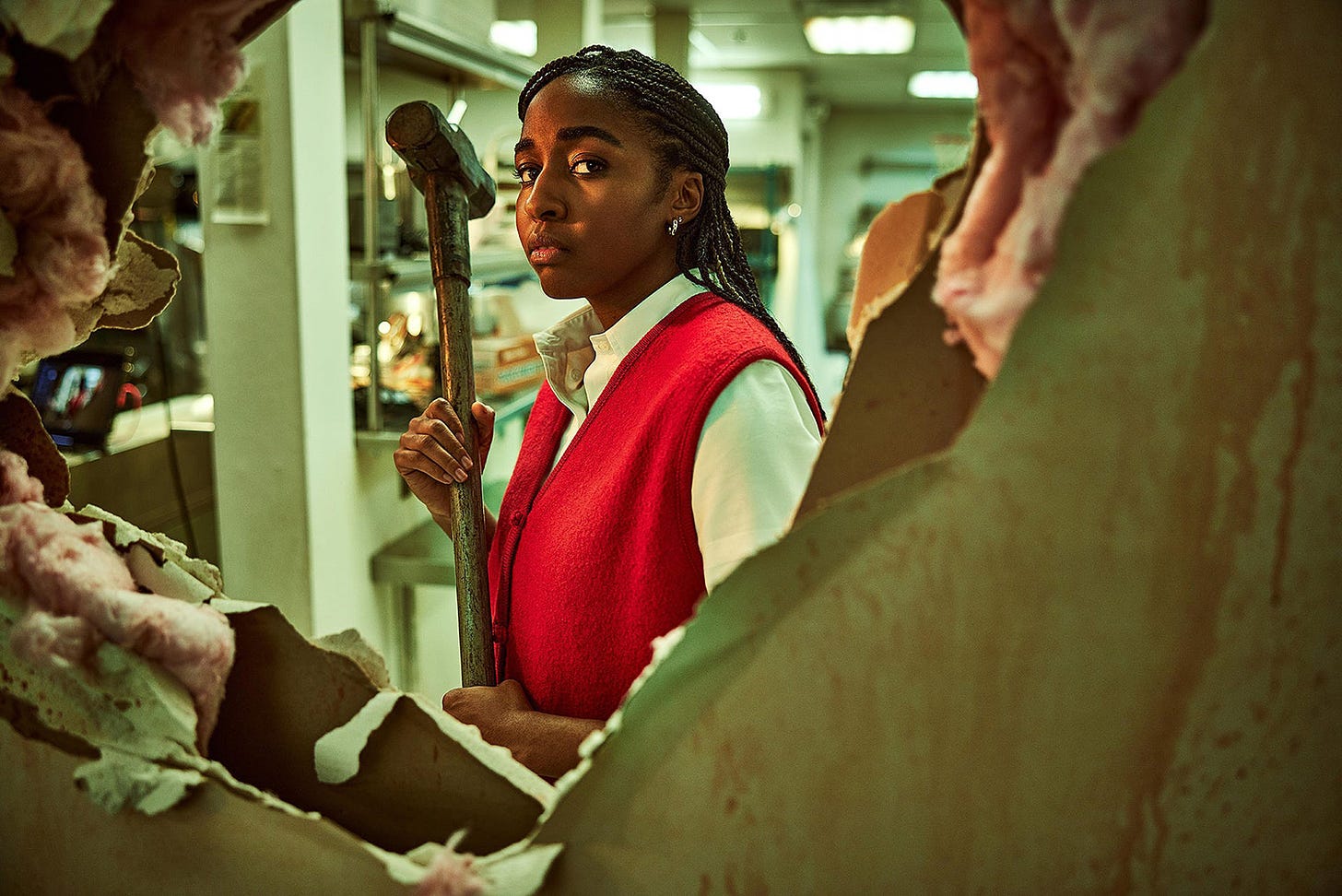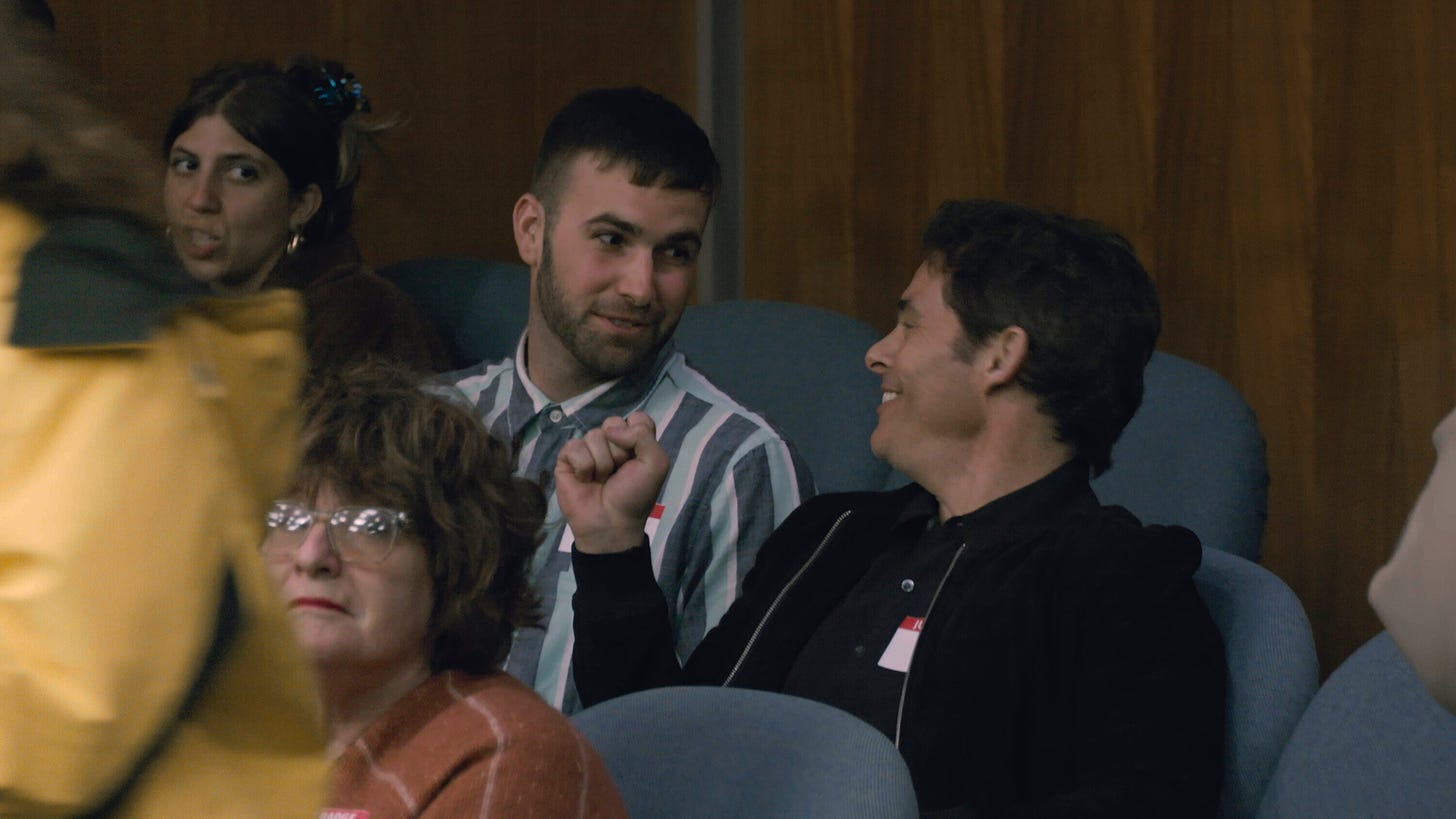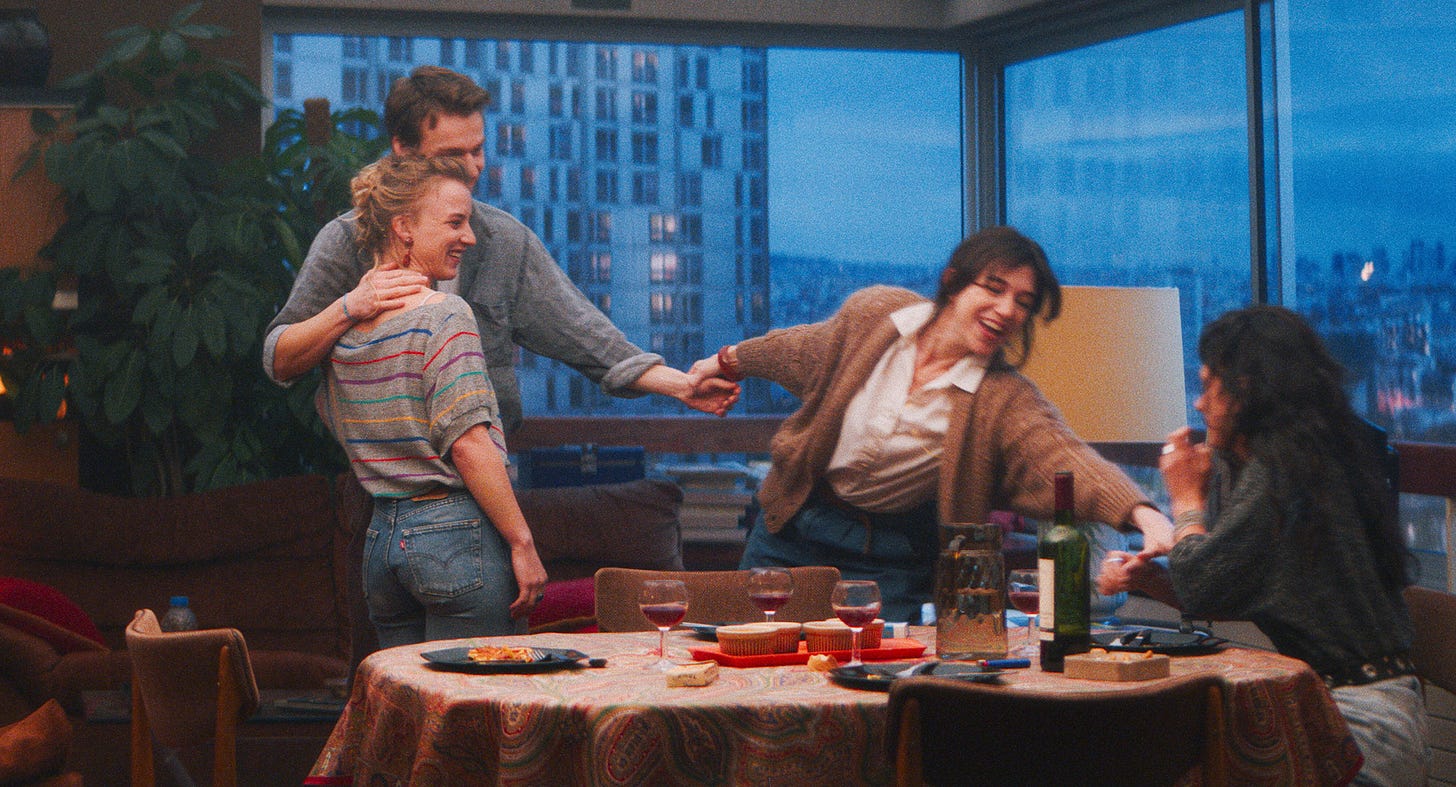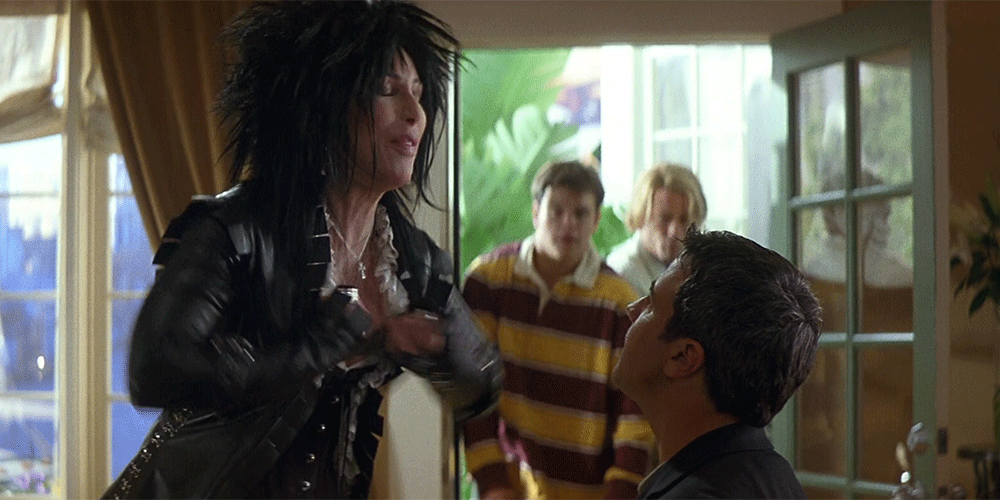The BARBIE marketing push is in full effect right now with Dream Mansion rentals and bus wraps inundating my social feeds. It’s going to be really funny when it destroys OPPENHEIMER because everyone is going to write their think pieces about the “death of cinema” again without pertinent context like how Christopher Nolan’s film is a full hour longer than Greta Gerwig’s and thus literally cannot screen the same amount of times in a week. Not that that will be the biggest reason. We’re talking about Barbie here. A ubiquitous, billion-dollar machine that has built-in nostalgia and present-day market share. Audiences will flock regardless of their motivations. Earnest, ironic, whatever. A ticket sale is a ticket sale.
Before we get there, though, we have the seemingly inevitable flopping of a new Indiana Jones and praise at the altar of Tom Cruise via another MISSION: IMPOSSIBLE. My only question is this: Will people go crazy about M:I being the first of two parts like they did with ACROSS THE SPIDER-VERSE’s inevitable cliffhanger? Media literacy really has gone the way of the dinosaur.
What I Watched:
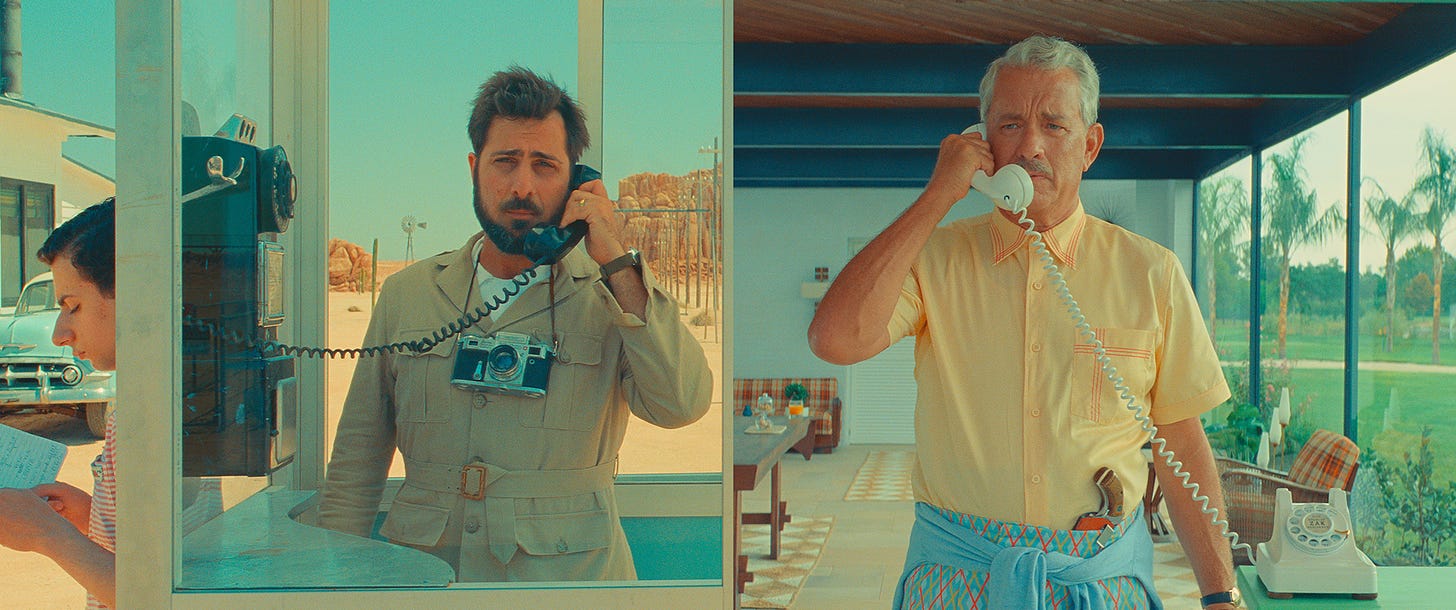
ASTEROID CITY
(now in theaters)
It’s a great opening. Bryan Cranston pops up on-screen as the host of a radio show, full frame and in black and white. He moves us on-stage to find playwright Conrad Earp (Edward Norton) typing away on the script about to be performed, shifting us to the backdrop and wings to peer upon lofi sets and period-specific aesthetic before opening everything up to the desert in widescreen color as though giving shape to our mind’s imagination. Instead of actors at the microphone and foley artists clanking away on random objects, we meet Augie Steenbeck (Jason Schwartzman), his son Woodrow (Jake Ryan), and three daughters pulling up to the one-pump station of ASTEROID CITY attached to a tow-truck. It’s a visual wonder shifting between form and function as well as process and artifice, begging us to ask ourselves what it will all be about.
That’s a question Augie asks himself by the tail-end of the film. Or, I guess I should say, it’s a question the fictional actor playing Augie asks by breaking the dual construct Wes Anderson has manufactured for the final time. He doesn’t receive an answer. Whether that’s because the purpose of the story he is acting out has none is up to you since we can ascribe meaning to anything if it touches us in a way that proves meaningful. If you ask me, though, I’d say Anderson’s latest is simply another hollow piece of undeniably effective artistry that delivers unforgettable characters and ample laughs in an otherwise forgettable package. Just like THE FRENCH DISPATCH before it and THE GRAND BUDAPEST HOTEL before that. I guess his days of substantive narratives ended with MOONRISE KINGDOM. It’s time to accept that style has officially prevailed to render substance moot.
And that’s all well good for entertainment’s sake because there are some genuinely great moments throughout this tale of teenage scientific geniuses dragging their parents along to a giant crater to vie for a five-thousand-dollar scholarship. Woodrow and his family (rounded out by Tom Hanks as Grandpa). Dinah Campbell (Grace Edwards) and mom Midge (Scarlett Johansson). Ricky Cho (Ethan Josh Lee) and dad Roger (Steve Park). Clifford Kellogg (Aristou Meehan) and dad J.J. (Liev Schreiber). And Shelly Borden (Sophia Lillis) and mom Sandy (Hope Davis). Their projects compete more than them. Their parents bicker and/or flirt. And random side characters with zero bearing on plot (see Maya Hawke’s teacher, her ten students, and Rupert Friend’s band) pop-up now and then for a gag or two. So, why not eventually introduce an alien too?
We move between the story and the production of the story via Cranston’s constant interjections with anecdotes about the writer, actors, and director (Adrien Brody). Sometimes it’s relevant. Most times it’s fluff. You’d probably be forgiven for forgetting Jeffery Wright is there as a representative of the US government alongside a slew of familiar faces or that Tilda Swinton plays a scientist more in awe of the child geniuses than their extraterrestrial encounter. Why? Because it’s funnier that way. To have this many characters all at once is to make it so delving into the history of any of them will only slow things to a crawl. So, Anderson wields them as color. He pulls them in for brief hijinks before going back to his de facto lead Augie, approaching the concept of a deeper emotional connection before remembering this character is emotionally stunted and thus incapable of delivering more than deadpan comedy.
Like Anderson’s previous two live action films (ISLE OF DOGS was even weaker), ASTEROID CITY is a device for irreverent fun. It’s a platform to get great actors together to play in a sandbox just left of reality that really pushes the boundaries of naturalism to their limits for affected caricature. Schwartzman does well to carry things even if his journey is more or less separate from the others, rendering his Augie just one piece of a sprawling ensemble. The kids steal the show on the performance side with a mix of Uzi and Ari Tenenbaum, Dudley, and the feral energy of the Khaki Scout Troop 55. And the production value and mise en scène combine to mesmerize on a sensory level alone. Put it all together and you get another breezy escape into Anderson’s singular quirk that ultimately makes you nostalgic for his earlier, objectively stronger work.
- 7/10
THE BEAR: Season 2
(streaming on Hulu)
How do you follow up a perfect season of television? This was the question running through my mind pretty much from the moment I finished the first season of THE BEAR knowing that a second had already been greenlit. It’s one thing to do so with a sitcom that doesn’t rely upon strict serialization since the characters and situational comedy are the draw. It doesn’t matter what they do, only the success of their actions. Christopher Storer’s show is different not only in its ability to often let its authentic drama overshadow the humor, but also in how concise and precise those initial episodes were in terms of scope and theme. He could have walked away and labeled it a miniseries. That’s how great and self-contained his narrative arc on grief, regret, and anxiety was. To therefore find a way forward by crafting another arc equally as effective and relatable seemed impossible to fathom. But he did it. He may have even bested it.
And why not? Grief doesn’t just disappear when you have an emotional breakthrough in your ability to process it. Carmy (Jeremy Allen White) isn’t going to just move on from his brother (Jon Bernthal’s Michael) committing suicide and leaving him the family restaurant he refused to let him work at. Neither is Richie (Ebon Moss-Bachrach), who in some regards has it worse since his sole utility in life was being Michael’s wingman. To therefore assume that the finale’s discovery of three hundred large in the pasta sauce will magically make everything better is beyond naive. It’s idiotic. Because A) three hundred thousand dollars isn’t going to be enough to remodel, repackage, and reopen a long-time Chicago staple sandwich shop into a fine dining destination and B) the distraction of fulfilling that dream (because opening a spot to call her own is Ayo Edebiri’s Sydney’s dream too) will only exacerbate the reality that no one on-screen has fully escaped their demons.
Carmy still battles his toxic temper and complete and utter lack of self-worth. Richie still wrestles with the reality that he’s never sought to discover purpose outside of who he is to another person (his ex-wife, his daughter, Michael, and now The Beef seem to be evaporating). And Sydney continues to reckon with the failure of her catering business and the reductive view that doing it herself put the blame squarely on her shoulders when the real issue was being alone and not her talent or competency to do the job. The hope then is that pooling their resources together can put them over the hump. That Carmy can walk out from beneath the shadow of an abusive chef to steward Syd. That she can grow and learn with a partner to get better and make him better too. That Richie might push the fear of obsolescence aside and realize he has the tools to be great if only he got out of his own way.
That’s the central theme of season two: personal growth. Carmy taking over The Beef showed those who worked there that they had the capability to be their best selves when given the room to excel. Now all of them moving towards The Bear is their collective chance to leverage that newfound confidence into execution and sustained success. How? By taking them out of their comfort zones and letting them sink or swim with new challenges. Storer and Joanna Calo have a wonderful knack of tapping into the past (both good and bad) to do so—using Carmy’s traumatic family life to sabotage his own path while also capitalizing on his extensive career to provide openings for his new friends to prosper upon theirs. That’s Tina (Liza Colón-Zayas) getting a crash course at culinary school. Marcus (Lionel Boyce) heading to Denmark to hone his dessert skills. And Richie, yes Richie, finding himself amongst the well-dressed “lizards” of Chicago’s most renowned dining experience.
And while those three get their own episode (or parts of a couple in Tina’s case), Carmy and Syd have their own challenges to face via life and love. She is dealing with the pressure of being in charge and a supportive yet worried father (Robert Townsend) wondering if the risk is too high. Carm is faced with the prospect of happiness via teenage crush Claire (Molly Gordon) at the exact worst time when you consider the focus needed to pull off what they’ve set out to do (gutting, hiring, and opening at lightning speed so Oliver Platt’s Uncle Jimmy doesn’t take ownership and knock it all down). Syd is neglecting that which matters to put everything into the restaurant. Carmy is sacrificing everything that has mattered to him for the past decade-plus to pursue that which should matter instead. Will they find a balance? Will they provide each other support? Or was the explosive nature of “Review” only the tip of the iceberg?
Season two possesses its own “Review” in the form of “Fishes” and yet it arrives in the exact opposite form. Where last year’s frenetic penultimate shitshow was a breakneck twenty-minute temper tantrum of attrition, this year’s powder keg of anxiety is a sixty-minute, star-studded flashback to Christmas at the Berzatto house. It’s the sort of unforgettably honest look at mental illness that television and movies often gloss over. One that should earn Bernthal a guest star Emmy nod for really capturing the pain that led Michael to suicide. I won’t lie and say the stunt casting wasn’t a distraction, but Sarah Paulson, John Mulaney, Bob Odenkirk, and Jamie Lee Curtis all pull through to show their inclusion wasn’t a lark. So much of what we know about Carmy and his sister Natalie (Abby Elliott) comes into stark shape here. Enough to make a line in the finale where Richie calls Carm by his mother’s name so damning yet tragically appropriate. The Berzattos are not well.
There are more cameos to come (see Will Poulter, Sarah Ramos, and Olivia Colman, and Gillian Jacobs) and all knock their them out of the park with a wonderful mix of context for the past and content for the future. But the real bright star of the whole is Gordon. Not only does she give an amazing performance in her own right as a necessary foil for Carm’s inability to escape his own head, but the blossoming romance and support system she supplies is second to none. Their warmth and magic and awkward smiles bring a vulnerability and hopefulness that really cuts through the tension (alongside Richie’s transformation and evolving dynamic with Syd and Natalie). Add an expanded role for Neil Fak’s (Matty Matheson) bottomless positivity and there’s almost too much love to be true. Thankfully Storer realizes this fact and reminds his characters that their biggest fear is joy inviting the other shoe. Not so much that he renders the progress made moot. Just enough to ensure we recognize the hurt that remains in their hearts.
- 10/10
JURY DUTY: Season 1
(streaming on Prime)
I’d love to see a behind the scenes documentary about Lee Eisenberg and Gene Stupnitsky’s JURY DUTY for one simple reason: the vetting process that went into choosing Ronald Gladden out of over 2,500 applicants to the project. Because it’s not just about finding someone who seems genuine and likely go along with the escalating gags. You must also anticipate the person’s morality to know how far you can push the envelope both in terms of the court case’s verisimilitude (it needs to feel as believable, interesting, and tedious as possible) and the hijinks of numerous weirdos doing all they can to improvise good, quality television under the constraints of an admittedly difficult assignment. Will Ronald have a hidden mean streak? Will he get frustrated and question the authenticity of what’s happening? Will he offer himself up to help Noah (Mekki Leeper) and Jeannie (Edy Modica) in their pursuit of a “soak”?
It’s a fascinating study because the real trial on-screen is one where Ronald becomes the unsuspecting defendant thrust into chaos without a safety net insofar as defaming his own character. Yes, he’s under the impression that he’s partaking in a “documentary” about the jury duty process and therefore acknowledges the existence of cameras. He can therefore intellectualize the need for being on his best behavior when he sees them, but what about the hidden cameras of which he’s unaware? He doesn’t know private scenes in his hotel are being filmed. He doesn’t know that an audience will be able to pick apart his lies with full awareness of the truth. So, the fact that Ronald proves a stand-up guy who tries his hardest not to rock the boat in a compassionate way is a testament to who he is as a person since the show gives him ample opportunity to prove the opposite. He could have mocked Todd (David Brown) or embraced Marsden’s ego as permission to be an ass himself. This exercise could have destroyed him.
You do then wonder if JURY DUTY would have been released had things gone that direction. Would the creators have risked crossing this ethical line of exposing someone who didn’t consent to the breadth of access (at least not in good faith) received if he hung himself rather than lifted himself up? I would have loved an extra episode dealing with these more philosophical issues as a counterpoint to the finale’s otherwise joyous revelation and clip show. Push the envelope a little further by explaining the thought process too. Because it’s one thing to pull the curtain and point out the crazy happy accidents and almost slip-ups. It’s another to expound on the logistics of maintaining a safe environment for all involved since we’re talking three straight weeks of artificial sequestering sans cellphones and internet access. The chance of something bad happening had to have been exponentially higher than that of something good.
I don’t want to discount Ronald’s altruism, though. Nor do I want to diminish the skill of the actors and writers surrounding him to steer his actions and make him feel welcome despite the fabrication. Because they all have to be “on” every second they’re in the same room as Ronald. They must be in character, trying not to break, while doing things that are objectively insane from an outsider’s perspective. That they were able to achieve that goal and submerse their mark in this world so deeply that his mind went to “it too crazy to not be true” instead of the opposite was ultimately the real draw for me since an appreciation of the game was much easier to maintain than an enjoyment of it over seven episodes. What’s superficially a repetitive game of chicken set within a series of skits that alternate between funny and stupid is actually a tense affair orchestrated by actors constantly wondering when/if they’ll be exposed. And they somehow pulled it off.
- 7/10
PASSENGERS OF THE NIGHT [Les passagers de la nuit]
(now in limited release)
While I cannot speak to the politics and obvious French-ness of the 1980s Paris period-specific setting, Mikhaël Hers’ PASSENGERS OF THE NIGHT succeeds on its relatable tale of complicated love, purpose, and evolution alone. Co-written by Maud Ameline and Mariette Désert, the filmmakers introduce lead character Elisabeth (Charlotte Gainsbourg) at her lowest. Her husband has left her to raise and house their teenage son Mathias (Quito Rayon Richter) and college-aged daughter Judith (Megan Northam) without providing any financial support. So, Elisabeth must find a job to sustain their current apartment and lives—something she hasn’t had to do since their births. With no work history or obvious training beyond a psychology degree (computer use is a nonstarter since she doesn’t understand the concept of saving files), she has no clue where to start.
Enter late night radio host Vanda (Emmanuelle Béart). Elisabeth has listened to her show as an insomniac for years, so she takes the opportunity to write a letter doubling as both a personal message like those read on air every night and an unsolicited application. What follows is a job as the new switchboard operator—menial on the surface, but profound in its impact. Vanda takes a chance on her and Elisabeth enters a world that supplies purpose and power. She even decides to pay it forward by inviting a young, unhoused woman (Noée Abita’s Talulah) to live in their spare room. Add Judith’s political radicalization in school and Mathias’ burgeoning hormones and the potential to upset this already fragile apple cart seems inevitable. That danger exists circa 1984 when this quartet first comes together and it remains in 1988 once they fatefully cross paths again.
The film is a character study through and through. Elisabeth and Mathias become our main focal points—lovelorn and vulnerable souls trying to find romance despite being too sensitive for their own good. Talulah becomes a lightning rod that sparks their desire to flip the cautious scripts they adhered to in the past. Elisabeth gives her trust. Mathias gives her love. And Hers makes certain his film exposes what those acts do to them as individuals rather than as co-dependent halves reliant upon this eighteen-year-old newcomer’s whims. Their wants won’t therefore always be satiated. Nor will their hopes always find fruition. But they’ll both become better people in the attempt and that’s what matters. Because this is but one chapter in their lives. A passage of upheaval and rebirth to discover that pursuing happiness on their terms is enough to know it will eventually be found.
- 7/10
Cinematic F-Bombs:
This week saw BOTTLE SHOCK (2008), EAT PRAY LOVE (2010), THE HOTTIE AND THE NOTTIE (2008), STUCK ON YOU (2003), and SUNSHINE STATE (2002) added to the archive. Can’t have a collection without Cher the “f-ing Oscar winner”. cinematicfbombs.com
New Releases This Week:
(Review links where applicable)
Opening Buffalo-area theaters 6/30/23 -
INDIANA JONES AND THE DIAL OF DESTINY at Dipson Amherst, McKinley, Flix & Capitol; AMC Maple Ridge & Market Arcade; Regal Elmwood, Transit, Galleria & Quaker
MAAMANNAN at Regal Elmwood
PAST LIVES at Dipson Amherst; Regal Transit & Quaker
RUBY GILLMAN, TEENAGE KRAKEN at Dipson McKinley, Flix & Capitol; AMC Maple Ridge & Market Arcade; Regal Elmwood, Transit, Galleria & Quaker
SATYAPREM KI KATHA at Regal Elmwood
SOUND OF FREEDOM [starting 7/3] at Dipson McKinley & Capitol; Regal Elmwood, Transit, Galleria & Quaker
SPY at Regal Elmwood
Streaming from 6/30/23 -
CHILDREN OF THE CORN – Shudder on 6/30
“I just wish it didn't have to be so generic. It once again seeks to sanitize source material that refreshingly embraced the futility of our struggle to survive our own attempts at self-extermination.” – Full thoughts at HHYS.
NIMONA - Netflix on 6/30
UNKNOWN: THE LOST PYRAMID - Netflix on 7/3
WHAM! - Netflix on 7/5
GOLD BRICK - Netflix on 7/6
Now on VOD/Digital HD -
ATTACHMENT (6/27)
“Gislason isn't wielding gimmicks as much as slowly peeling back the layers he's built upon an ancient truth those involved were too scared to confront head-on. This film grounds itself as far as how dybbuks and the like would appear in our reality.” – Full thoughts at The Film Stage.
BLIND WILLOW, SLEEPING WOMAN (6/27)
CONFIDENTIAL INFORMANT (6/27)
KNIGHTS OF THE ZODIAC (6/27)
MONTRÉAL GIRLS (6/27)
T.S. ELIOT'S FOUR QUARTETS (6/27)
FRANCESCO (6/29)
GIVE ME AN A (6/29)
IN THE COMPANY OF ROSE (6/30)
LOVE GETS A ROOM (6/30)
THE MAN FROM ROME (6/30)
THE UNSEEN (6/30)





